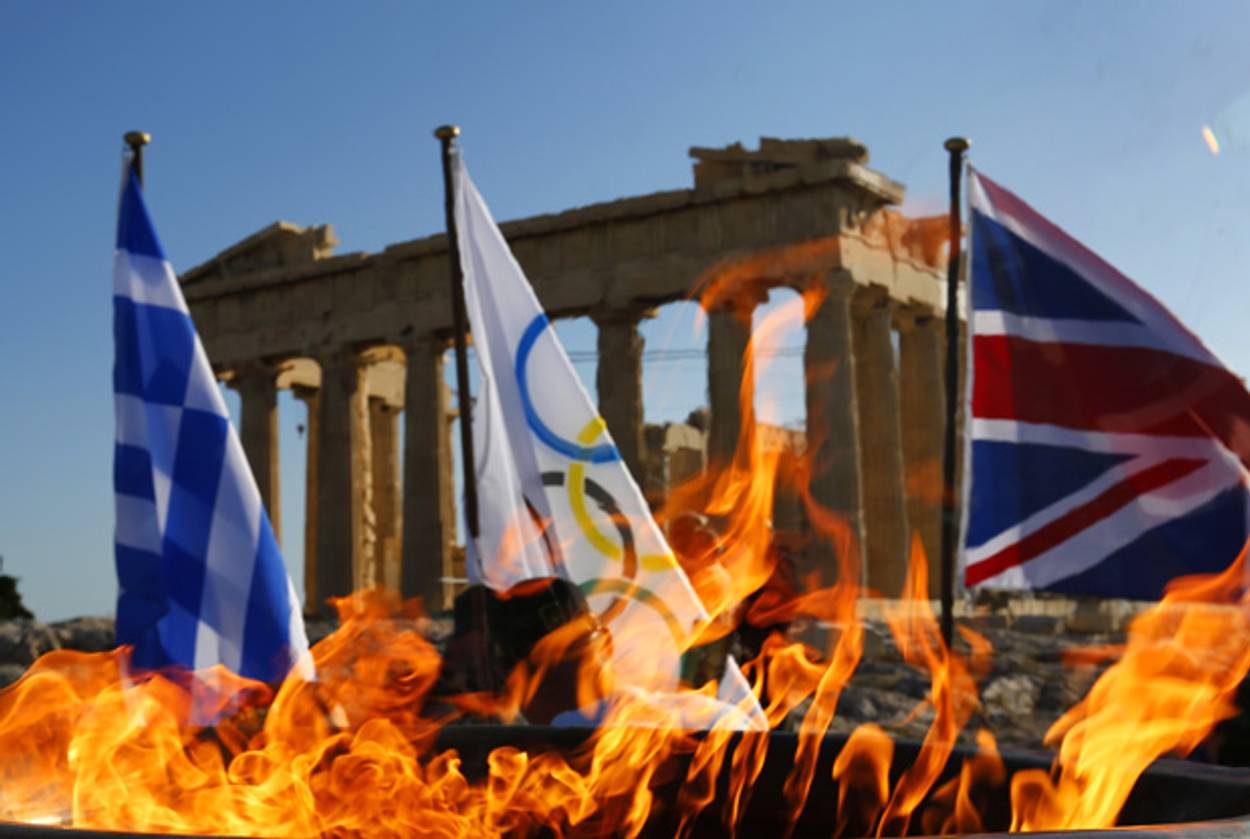Olympic Lessons for Jews
To better promote our interests, Jews should take a page from the International Olympic Committee




The Olympics are less than two weeks away, and I can’t wait to see the world’s best Basque Pelotists competing for glory, chiseled roque players giving it their all, and the burly men of all nations leaning in for the gold in the tug-of-war finals.
Alright, so no medals are given out for tug-of-war. But they used to be, in every Olympics between 1900 and 1920. Roque, a variation on croquet, was a major hit in the 1904 games, held in St. Louis; the Americans were the only ones competing and won all three medals. And Basque Pelota—too weird to explain, but imagine some combination of softball, squash, and flamenco—made only one appearance, in 1900, but made enough of an impression to be played in noncompetitive demonstrations in 1924, 1968, and 1992. Traveling the opposite direction are rugby and golf: After a century in exile, the two will once again be Olympic sports starting in 2016.
As anyone who has watched even a few minutes of curling surely knows, some Olympic events barely seem worthy of being called a sport. How, then, to decide which athletes will get a chance of chatting with Bob Costas and which will continue to perspire in obscurity? To answer that question, the International Olympic Committee has issued a document titled “Evaluation Criteria for Sports and Disciplines,” a thorough blueprint by which to Talmudically explore a sport’s every merit and flaw.
It’s easy enough to mock the IOC as a byzantine and shady organization, or to dismiss the Olympics as the kind of cynically commercialized extravaganza in which sponsors compete for marketing supremacy. But there’s still something beautiful about the Olympic spirit. Not that brotherhood-of-man hokum: Any institution that can’t even bring itself to commemorate 11 athletes born in seven different nations and slain under its watch can’t claim any moral distinction. Rather, everything that’s inspiring about the IOC is embodied in that codex of criteria.
The document has five general areas of consideration. There’s history and tradition, there to provide a sense of historical continuity and safeguard against the dominion of fads. There’s universality, making sure that the sport in question is enjoyed by men and women of different cultural sensibilities the world over. There’s popularity, measuring the sport’s ability to attract media coverage and public interest. There are financial considerations, which are obvious. And then there’s the image clause, which concerns itself with the sport’s impact on the environment, its gender equity, and its ability to remain “as objective and fair as possible.”
This may not seem like much of a masterwork, but it’s an elegant and thoughtful solution to the sort of problem larger and more necessary organizations than the IOC constantly face. Religions, in particular, are permanently in need of balancing the dictates of antiquity with the changing sensibilities of their flocks. Usually, they make decisions based on politics, or on clashing personalities, or on what they think a majority of their constituents might favor. They would be well-advised to adopt the Olympic methodology and aspire instead to become loosely structured coalitions, as concerned with earthly matters as they are with the divine will, in constant flux and thrilled about it.
As one recently released population survey demonstrates, Jews may need to heed this advice a bit more urgently than others. Canvassing the largest Jewish community in America, that of the greater New York metropolitan area, the survey found a community growing in numbers and increasing in diversity: Russian, Israeli, and Syrian Jews, gay and straight, biracial and intermarried, affiliated and not. Usually, discussions of such findings tend to include some reference to Jewish unity and some concerned comment that there appears to be less and less that holds us all together as a people.
It’s a bad argument. Forget unity. Just look at the Olympics: To grow from the nine sports represented in the first modern games in 1896 to the 26 we’ve today, the Olympic committee had to learn how to allow more sovereignty to each sport’s individual governing body. It had to learn to see its own role as primarily organizational in capacity. And it had to design a platform that would allow it to make difficult decisions and cut events that refused to keep up with the times or with the Olympic spirit.
Might we do the same? Instead of focusing tremendous efforts on futile attempts to reach a consensus on highly controversial matters—conversion, patrilineal descent, intermarriage—we should celebrate our differences and realize that the Orthodox is to the Reform what the 100-meter sprinter is to the pole vaulter: a colleague, not a competitor. They play fundamentally different sports and would be foolish for arguing over who is the real athlete. Instead of trying to fund the sorts of projects that have wide communal appeal, let’s go narrow and deep, focusing our attention on small segments instead, the way each sporting federation pampers its own athletes, making sure that when they do finally step out onto the big stage, and meet other athletes who play different sports, they’re at their absolute finest. And instead of having dozens of organizations that claim to speak for all Jews, let’s have one body that will claim to speak for none. Like the IOC, this new governing body of American Jewry should not try to unite us but rather provide good guidelines for having productive arguments. There’s no other way of getting better at them.
***
Like this article? Sign up for our Daily Digest to get Tablet Magazine’s new content in your inbox each morning.
Liel Leibovitz is a senior writer for Tablet Magazine and a host of the Unorthodox podcast.
Liel Leibovitz is editor-at-large for Tablet Magazine and a host of its weekly culture podcast Unorthodox and daily Talmud podcast Take One. He is the editor of Zionism: The Tablet Guide.